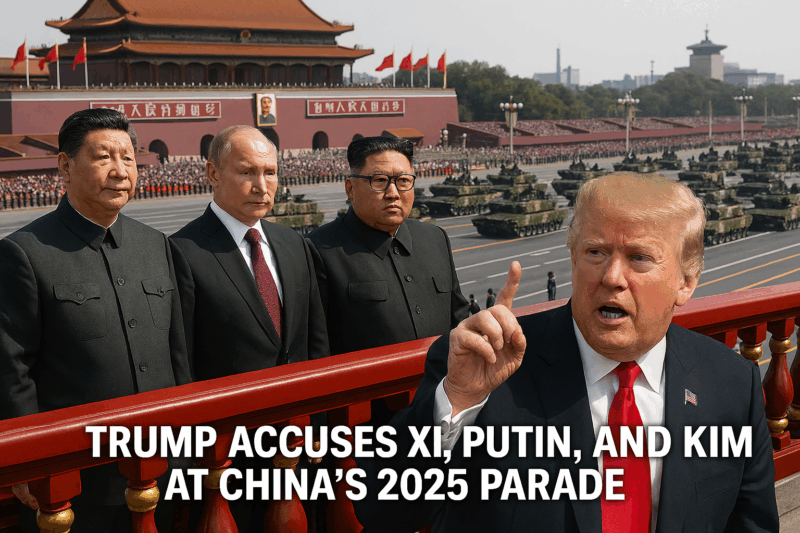A Tense Message Amid Beijing’s Show of Strength
On September 3, 2025, as Chinese President Xi Jinping hosted Russia’s Vladimir Putin and North Korea’s Kim Jong Un at Beijing’s grandest military parade, U.S. President Donald Trump issued a sharp rebuke. In a Truth Social post, he accused the trio of “conspiring against The United States of America,” casting a shadow over the event meant to mark the 80th anniversary of Japan’s World War II surrender. The parade, with its display of hypersonic missiles and thousands of troops, was a bold statement of China’s rising power, but Trump’s words highlighted deepening global tensions, raising questions about the intent behind this unprecedented gathering.
Human Impact of the Geopolitical Standoff
The parade’s spectacle, attended by 50,000 spectators, disrupted life in Beijing, with tightened security and traffic restrictions affecting residents. For citizens in China, Russia, and North Korea, the event symbolized national pride but also underscored economic struggles—China’s youth unemployment hovers at 15%, Russia faces Western sanctions, and North Korea’s populace endures chronic shortages. Trump’s accusation, while aimed at leaders, resonates with Americans wary of foreign alliances, particularly as U.S. families recall the 400,000 lives lost in World War II, including those who fought in the Pacific to aid China against Japan.
Facts and Figures
The September 3, 2025, parade in Tiananmen Square featured 12,000 troops, hypersonic missiles, AI-powered drones, and the nuclear-capable Dongfeng-61 missile, according to state media. Twenty-six world leaders attended, including Putin, Kim, and Iran’s Masoud Pezeshkian, but Western presence was limited to Slovakia’s Robert Fico and Serbia’s Aleksandar Vučić. The event followed the Shanghai Cooperation Organization summit, where Xi, Putin, and India’s Narendra Modi signed 20+ cooperation agreements. Trump’s Truth Social post, viewed by millions, claimed the U.S. contributed “massive support and ‘blood’” to China’s WWII victory, a point echoed in his radio appearance where he dismissed concerns about a China-Russia axis, citing U.S. military strength.
Broader Geopolitical Context
Xi’s parade, showcasing China’s military modernization, positions Beijing as a counterweight to the U.S.-led order, strained by Trump’s 50% tariffs on nations like India for buying Russian oil. The “Axis of Upheaval”—China, Russia, and North Korea—gains traction as Putin seeks relief from sanctions and Kim pursues legitimacy for his nuclear program. South Korea reports 15,000 North Korean troops aiding Russia in Ukraine, with 2,000–600 killed. However, analysts like Zhu Feng argue China avoids a formal bloc, wary of North Korea’s nuclear ambitions and past U.S.-China WWII cooperation. The Kremlin dismissed Trump’s conspiracy claims, with aide Yuri Ushakov suggesting irony, while Xi’s speech framed the world’s choice as “peace or war.”
What Lies Ahead: Navigating a Fractured World
Trump’s accusation reflects frustration with stalled Ukraine peace talks and China’s economic support for Russia, including $70 billion in annual trade. The parade’s optics suggest closer China-Russia-North Korea ties, potentially leading to joint military exercises, as predicted by analyst Youngjun Kim. Yet, China’s neutral stance on Ukraine and ongoing U.S.-China trade talks, with a possible Trump-Xi meeting by November, offer hope for de-escalation. Strengthening dialogue through forums like the UN, rather than escalating rhetoric, could prevent a slide toward conflict.
Kremlin’s Response to Allegations
Kremlin spokesperson Dmitry Peskov rejected Trump’s claims, stating no conspiracy exists and that Russia, China, and North Korea act “for the greater good” of their people, not against others. This aligns with Putin’s comments praising “good relations” with Trump, suggesting diplomatic channels remain open.
Conclusion: A World at a Crossroads
Trump’s accusation of conspiracy against Xi, Putin, and Kim during China’s 2025 military parade underscores a volatile moment in global relations. The event, a dazzling display of China’s military might, signals a challenge to U.S. dominance, yet the leaders’ differing agendas—economic survival, sanctions relief, and nuclear legitimacy—complicate a unified front. As humanity faces Xi’s “peace or war” choice, Trump’s words remind us of the need for diplomacy to honor past sacrifices and prevent future conflicts, ensuring a stable world order.






